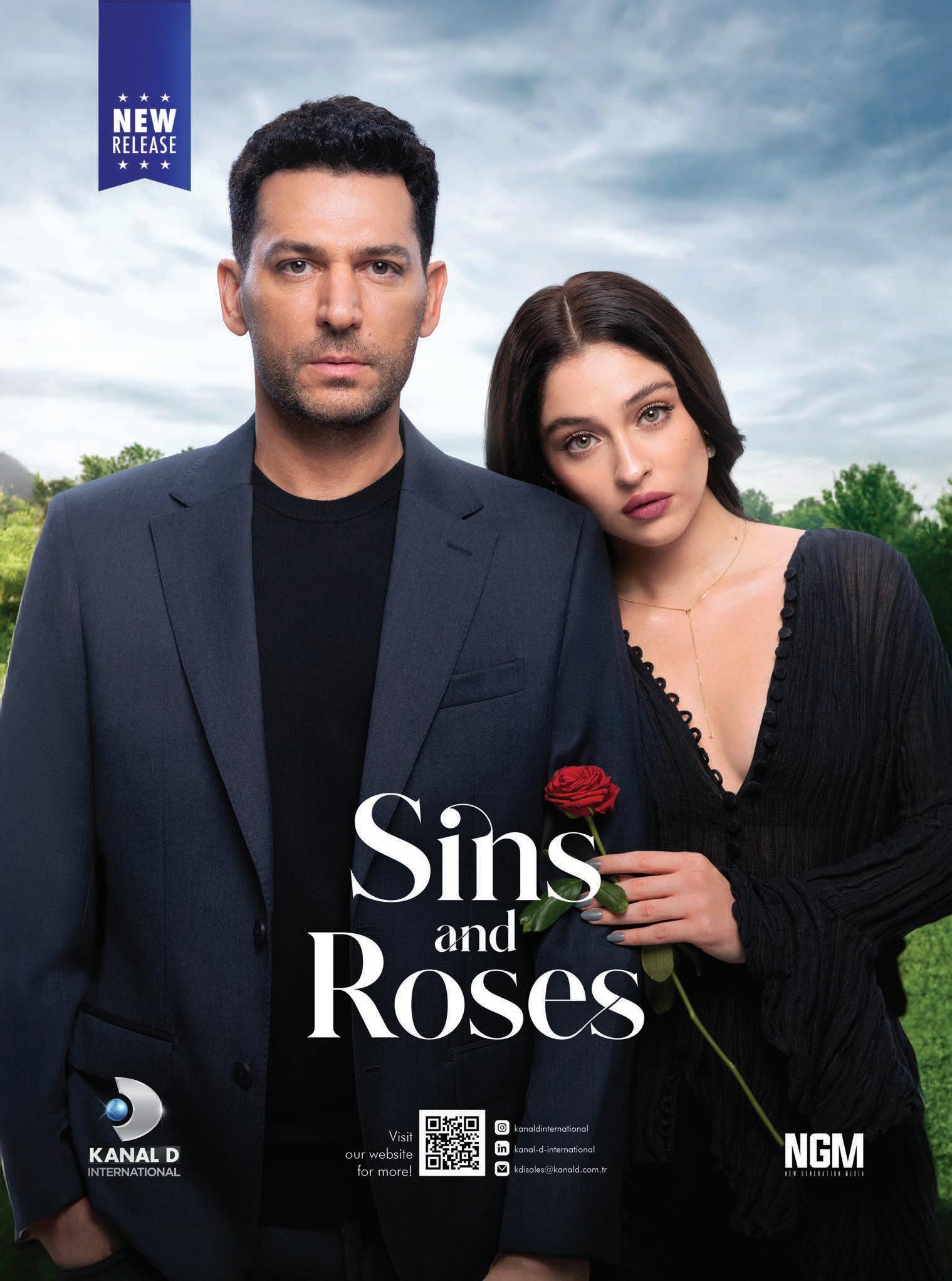Scripted Financing Trends / Micro-Drama Boom / Inter Medya’s Can Okan King & Conqueror ’s Kitty Kaletsky & Robert Taylor / Vanguard’s Alex Haridi & Goran Kapetanović
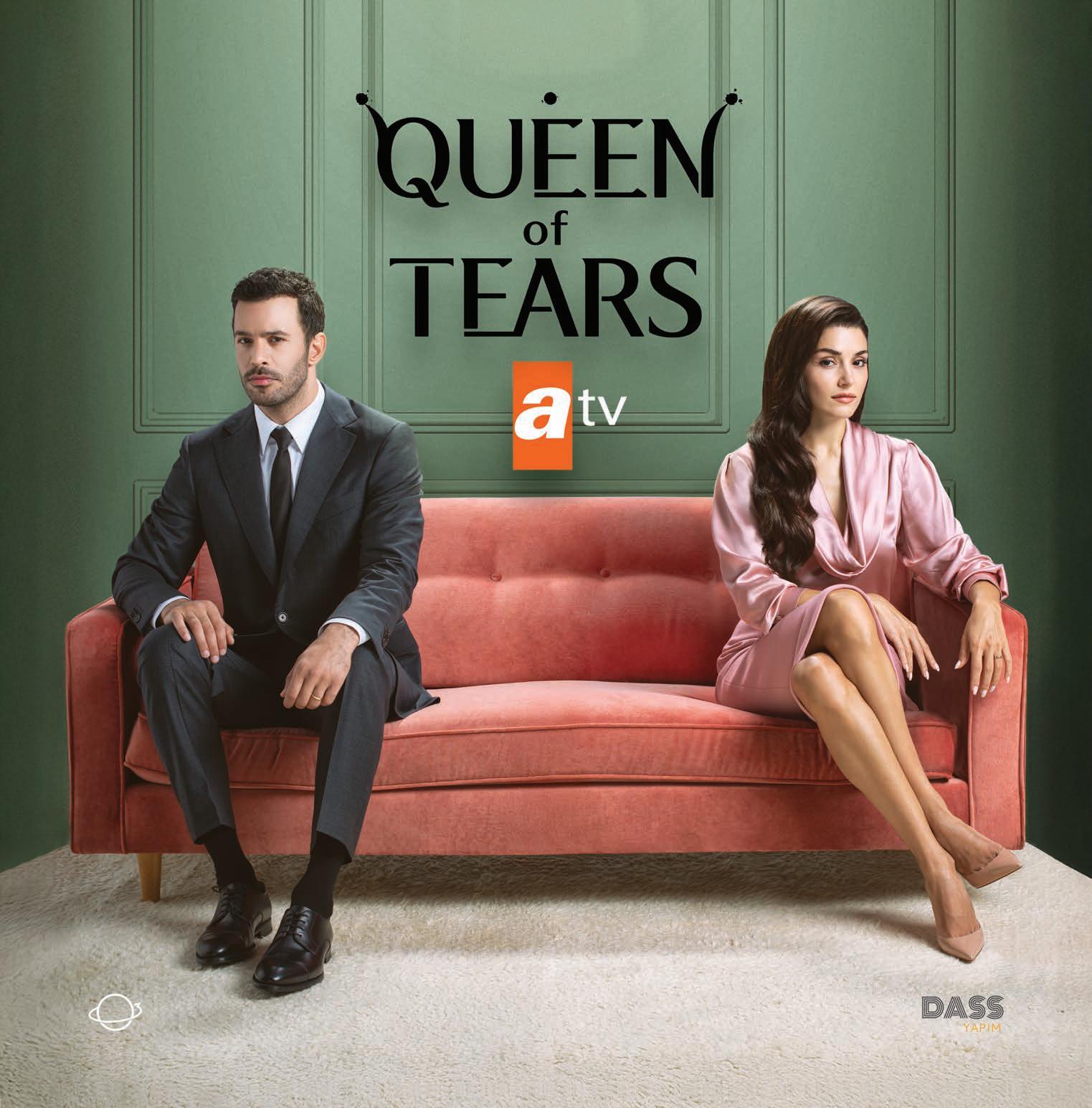
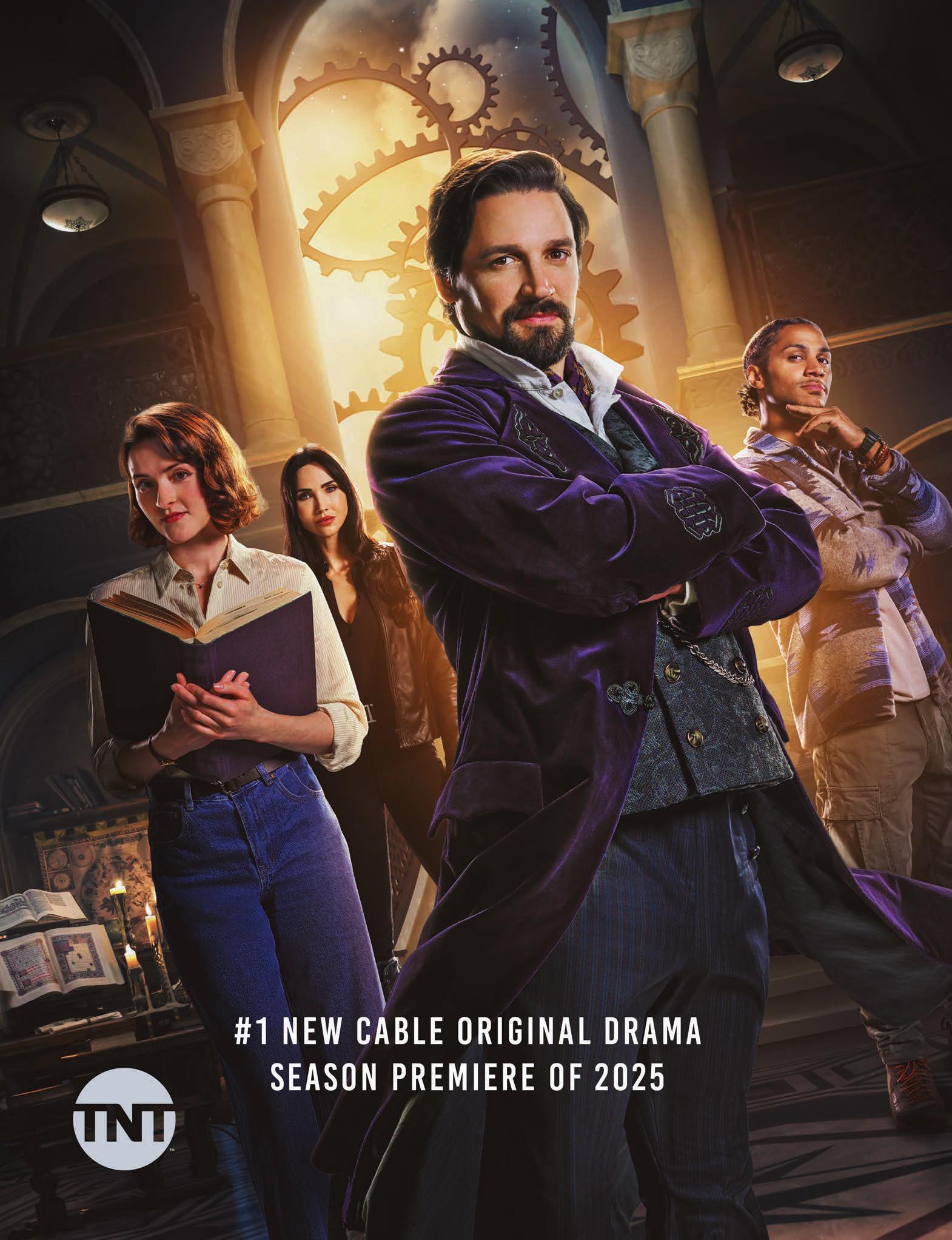
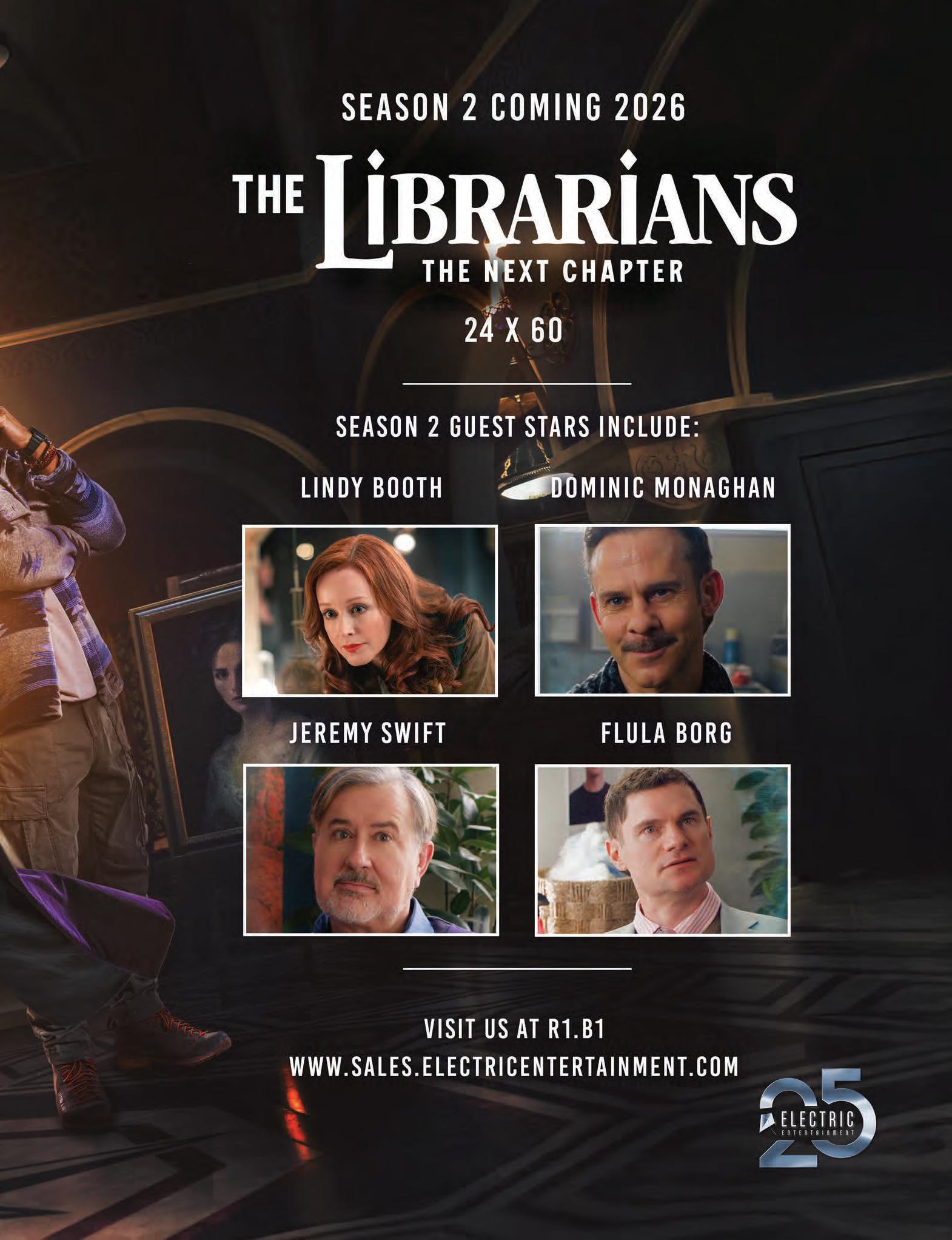
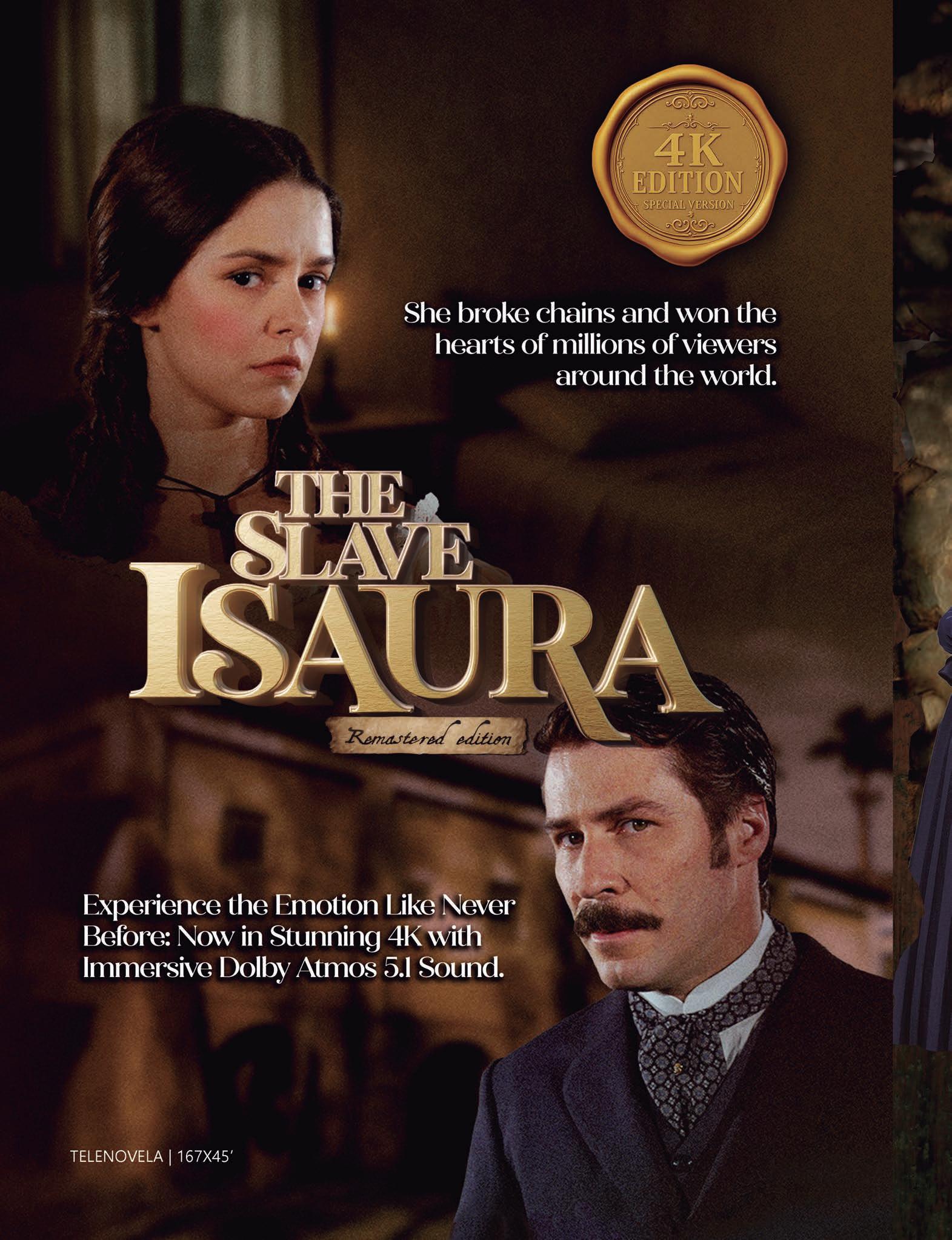
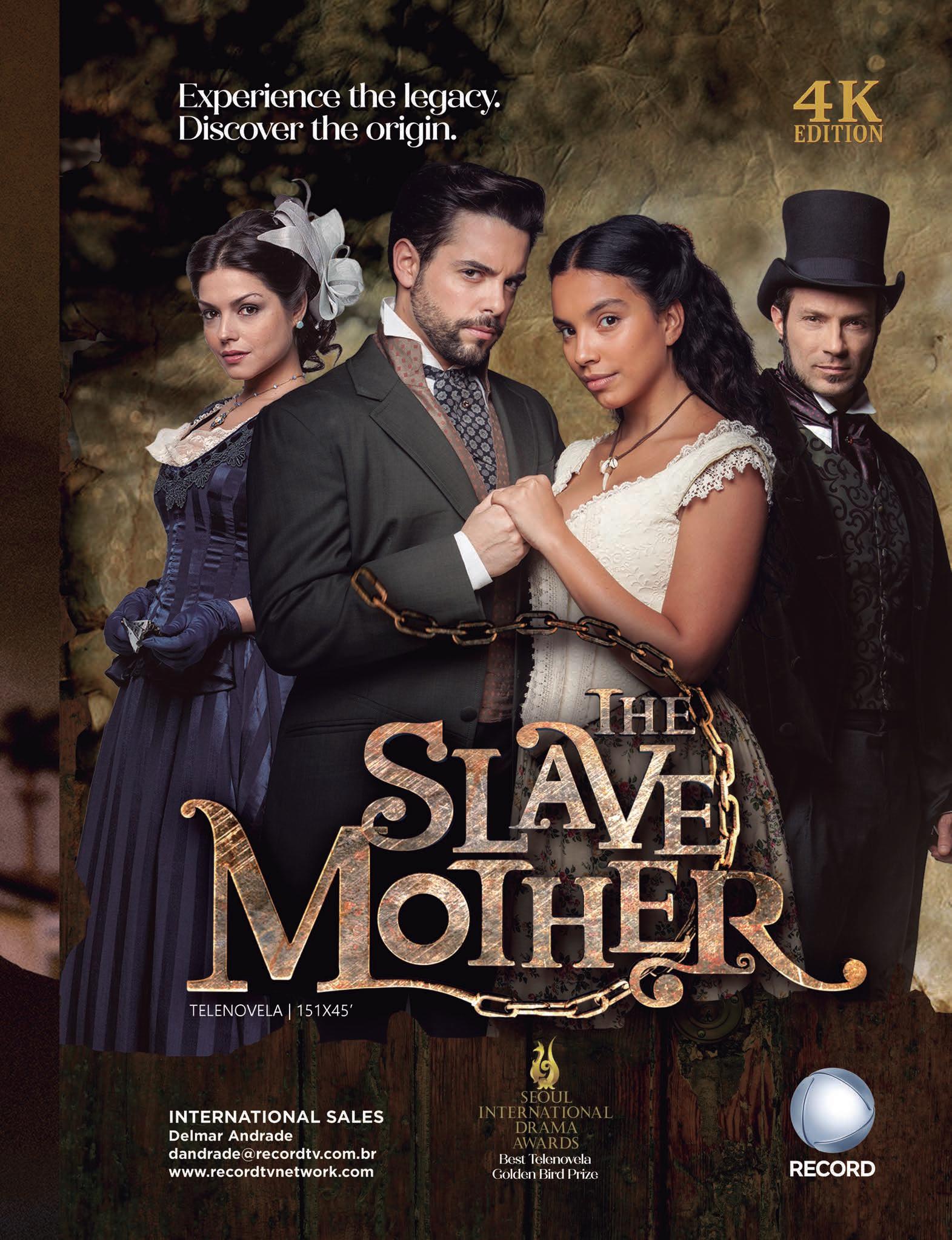


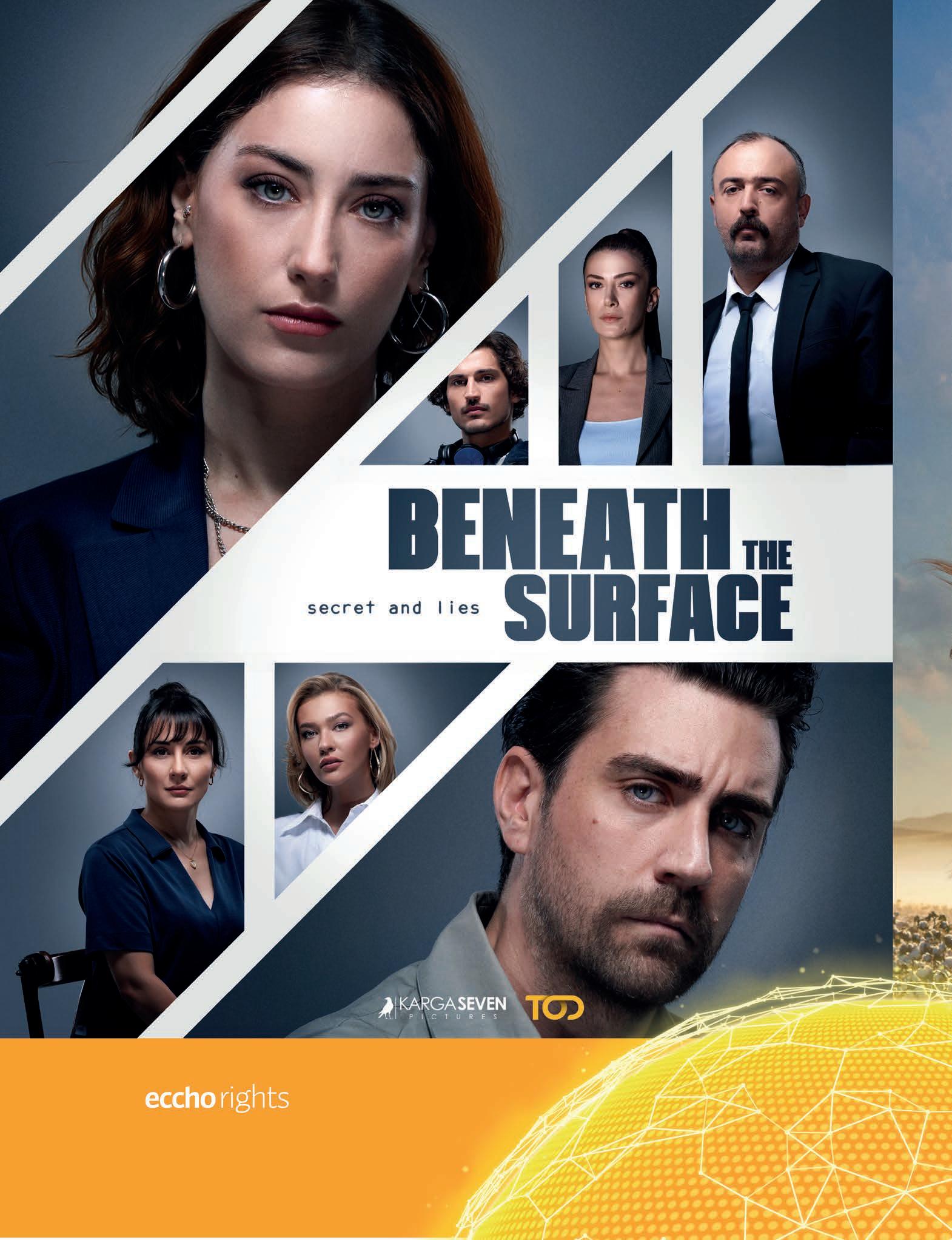

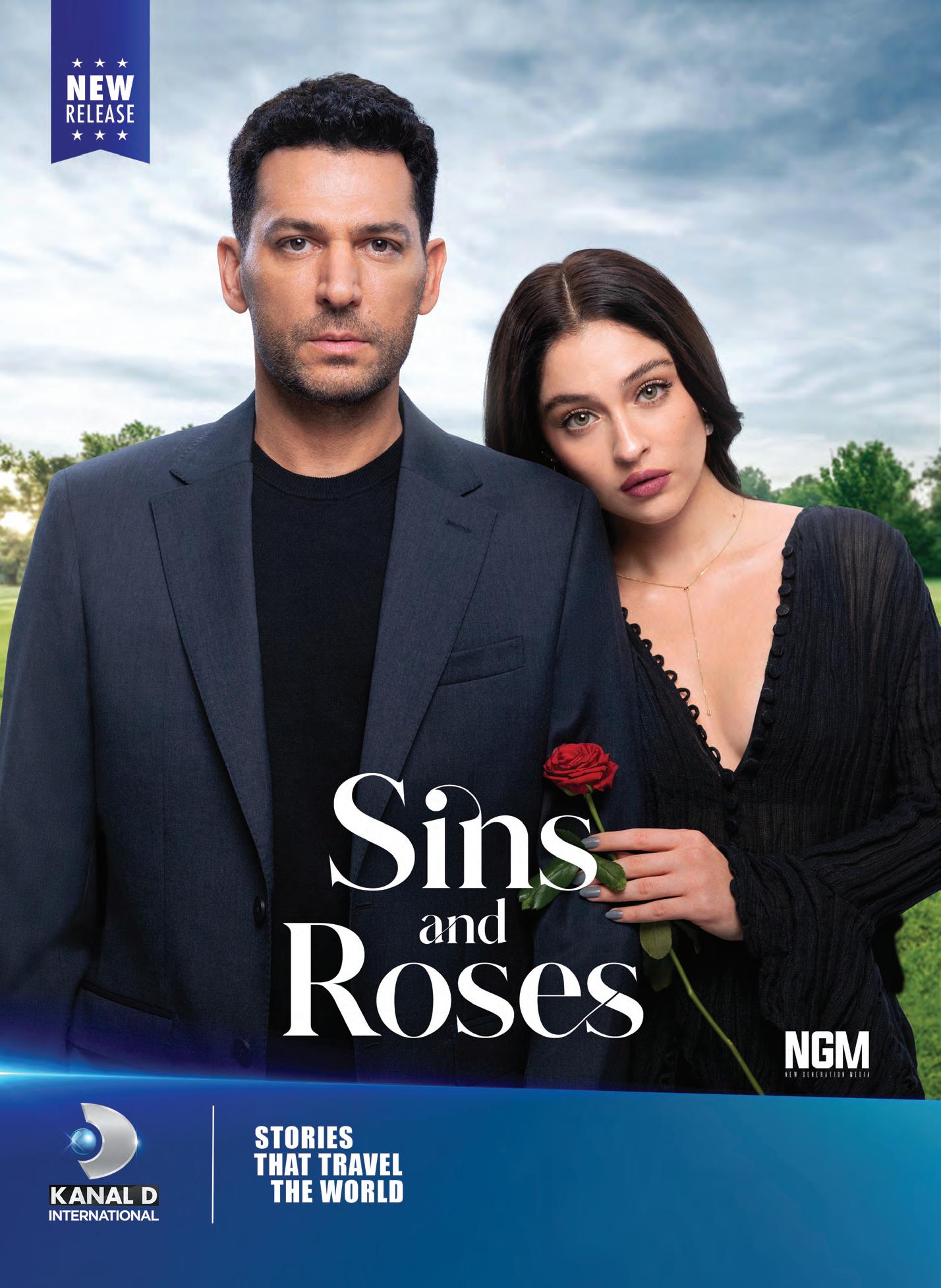



Scripted Financing Trends / Micro-Drama Boom / Inter Medya’s Can Okan King & Conqueror ’s Kitty Kaletsky & Robert Taylor / Vanguard’s Alex Haridi & Goran Kapetanović












Revenues in China from micro-dramas are projected to exceed that of the local box office this year; 830 million people in that market are regularly tuning into these bite-size dramas, according to a recent study.
In an era of reduced commissions, a broad selection of distributors and producers weigh in on charting a new path forward.
Ricardo Seguin Guise Publisher
Mansha Daswani Editor-in-Chief
Jamie Stalcup Managing Editor
Kloudia Sakowski Associate Editor
David Diehl Production & Design Director
Simon Weaver Online Director
Dana Mattison Sales & Marketing Director
Genovick Acevedo Sales & Marketing Manager
Ute Schwemmer Bookkeeper
Media Partners Asia’s (MPA) The Micro-Drama Economy projects that the market outside of China will generate revenues of almost $10 billion by 2030. “Micro-dramas have evolved from a niche experiment to a multi-billiondollar global category,” says Vivek Couto, executive director of the MPA, of the Asian-originated trend. “Production is cheap, but distribution is costly, and success depends on speed, scale and repeatable IP. China’s ecosystem shows what’s possible when content is integrated into social and payments rails, while the U.S. is proving the viability of global expansion.”
Meanwhile, the traditional long-form scripted business is restructuring for its own future amid a slip in commissions. Our main feature in this edition heard from a broad array of producers and distributors about navigating this climate. Pool your resources was the overarching theme to emerge from those conversations; it takes a village, often, to get these shows made.
Kitty Kaletsky and Robert Taylor, two of the executive producers on King & Conqueror, are featured in this edition, discussing how they brought that landmark production together to tell—for the first time in the scripted space—the story of the chain of events leading to the Battle of Hastings. “It was a necessity of our financing that it was a multiparty co-production process,” Taylor says. “It’s also a truly international show in terms of what our story means for the formation of what is now Europe.”

After sweeping across Asia, the micro-drama boom is reverberating throughout the scripted ecosystem.

Ricardo Seguin Guise President
Mansha Daswani Associate Publisher & VP, Strategic Development
TV Drama ©2025 WSN INC.
401 Park Avenue South, Suite 1041, New York, NY 10016, U.S.A. Phone: (212) 924-7620
Website: www.tvdrama.com
Jan Stenbeck’s transformative impact on European media translated into broad interest in Vanguard, the SVT commission about the Swedish media mogul. The New8 alliance of pubcasters backed the series, which we hear more about from writer Alex Haridi and director Goran Kapetanović.
Across our conversations, it was clear that delivering epic-scale storytelling is still possible—and still highly sought after. Audiences may be embracing storytelling in 1- to 3-minute bursts, but they’re not abandoning the long-form space. The challenge for everyone in the business is figuring out how to make new financing and discovery models make sense. Mansha Daswani

King & Conqueror’s Kitty Kaletsky Inter Medya’s Can Okan


Las hijas de la criada (The Maid’s Daughters) / ¿A qué estás esperando? (What are you waiting for?) / Sueños de libertad (Dreams of Freedom)
Atresmedia Sales’ slate features Las hijas de la criada (The Maid’s Daughters), a series about revenge, heartbreak and a mother’s fight to secure her daughter’s legacy, set in Galicia in 1900 and based on a best-selling novel. Also available is ¿A qué estás esperando? (What are you waiting for?), also book-based, a rom-com about a man who is pressured by his family to get married. Life in Perfumerías de La Reina continues in the second season of Sueños de libertad (Dreams of Freedom), with new characters arriving and disrupting Begoña’s life. These titles are “about love, revenge and family and show empowered women who fight for their freedom,” says Rebeca Fernández, sales director for Europe. The company is showcasing its slate of Spanish scripted at a new stand, Fernández adds.
Queen of Tears / Waves of Love / The Nightfall
ATV Distribution is touting a lineup that showcases “the diversity and strength of Turkish storytelling,” says Müge Akar, head of sales. Queen of Tears is an adaptation of a Korean drama starring Hande Erçel and Barış Arduç. Waves of Love features “sweeping landscapes, family-centered storylines and emotional depth,” says Akar. The Nightfall combines romance and mystery and “has quickly emerged as one of our strongest contemporary titles,” Akar notes. She adds, “Alongside Queen of Tears and Waves of Love, we are also bringing the brand-new season of The Ottoman , the flagship title that continues to achieve strong results in Turkey and internationally. We are committed to telling stories that resonate emotionally, deliver strong ratings and offer reliable commercial performance for our buyers.”
Eccho Rights is bringing to MIPCOM Terra Rossa, a new romantic series starring Engin Akyürek that “blends the best of Turkish drama that our buyers love: passionate storytelling, unforgettable characters and an enchanting setting,” says Herbert Kloiber, CEO. The Trio is a romantic drama from Sweden, based on the novel Trion by Johanna Hedman. The Hairdresser Mysteries, a light comedy drama, stars Sally Phillips as a crime-cracking local hairdresser. These projects “underline the two main pillars of our business,” Kloiber says. “We offer the best lineup of Turkish drama series in a hugely competitive market, while in Western Europe, we are working with all key stakeholders—IP owners, producers, commissioners and also listening to our buyers—to produce and bring to market the series that people really want.”
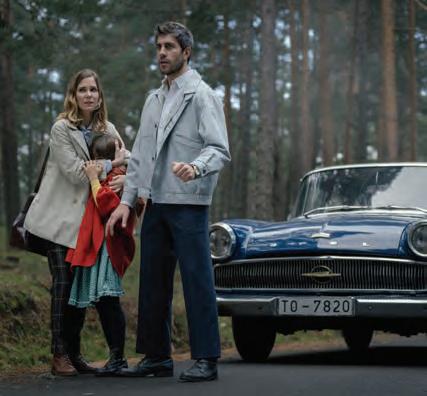

“Atresmedia continues to be the home of some of the best Spanish productions, offering titles that stand out for their quality and variety.”
—Rebeca Fernández


“Our mission is to deliver high-quality Turkish dramas that travel across cultures and regions.”


“Eccho Rights’ offering is truly unique, and we look forward to meeting with clients, both new and old, to showcase our latest work.”
—Herbert Kloiber

Librarians: The Next Chapter / The Ark / Leverage
Two seasons of The Librarians: The Next Chapter are available from Electric Entertainment. Electric is also offering two seasons of The Ark, plus a third that is currently in production. Additionally, the slate features five seasons of Leverage and three seasons of the spin-off series Leverage: Redemption “Leverage, Leverage: Redemption and The Librarians: The Next Chapter come with built-in worldwide fan bases, while The Ark delivers an original, high-stakes sci-fi adventure that resonates across cultures,” says Sonia Mehandjiyska, head of international distribution. “Together, they offer buyers recognizable brands, strong audience demand and broad international marketability.” In addition, “we’re excited to bring the hit YouTube series Sideswiped to the market and explore partnerships on future seasons,” Mehandjiyska adds.
Eshref Ruya / Valley of Hearts / Heartstrings
Inter Medya’s MIPCOM offering is led by Eshref Ruya , a love story that centers on Eshref, a high-ranking member of a mafia syndicate who spent years searching for a girl he once loved from afar as a child, nicknamed “Ruya,” meaning “dream.” Nisan, a young musician, ends up entangled in his world working as an informant for the police. Unbeknownst to Eshref, she is the long-lost Ruya he has been searching for. Valley of Hearts tells the story of a woman who abandoned her twins as newborns and lives a wealthy life. As adults, the twins confront her and seek retribution. Heartstrings follows the fallout of a hospital error in which Mahinur Aydın and Aras Yılmazer’s babies are switched at birth. The mistake is discovered years later.
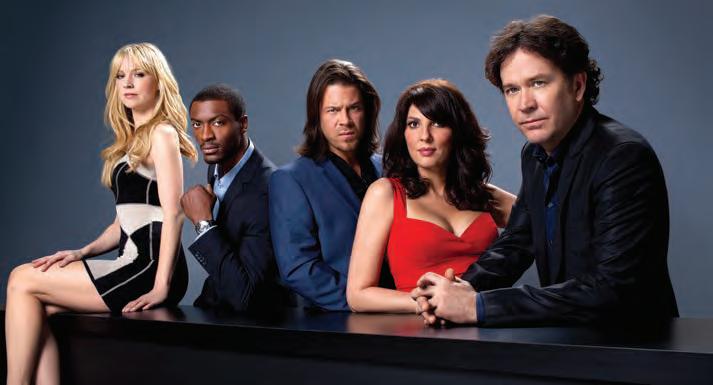

“We’re thrilled to share that we’ll be kicking off our 25th anniversary celebrations at MIPCOM.”
—Sonia Mehandjiyska

Sins and Roses from Kanal D International stars Cemre Baysel and Murat Yıldırım in a slowly blossoming love story. Secret of Pearls returns with a new season, continuing the story of a man who is released from prison and wishes to reunite with his children. In The Family Burden, a woman who was wrongfully imprisoned for her husband’s murder searches for the true killer upon her release. “The depth of the stories and the way they portray family dynamics allow every viewer to find a piece of themselves within these narratives,” says Elif Tatoğlu, distribution strategy and sales director. She adds, “Family is a deeply valued concept across all cultures, and dramas that explore it from different angles and with real depth tend to resonate strongly with audiences.”
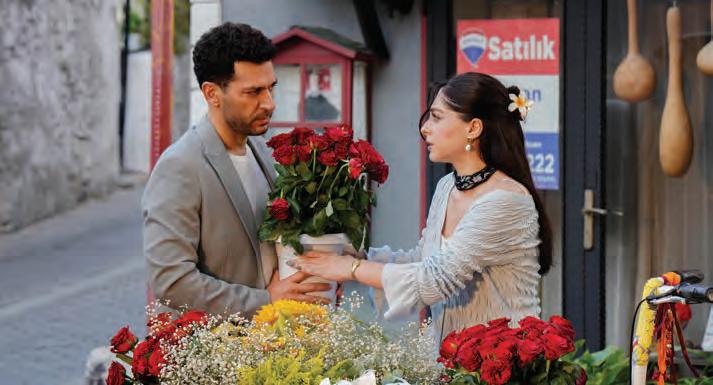

“With
its strong storytelling, rich character development and timeless narratives, our library provides stories that resonate universally.”
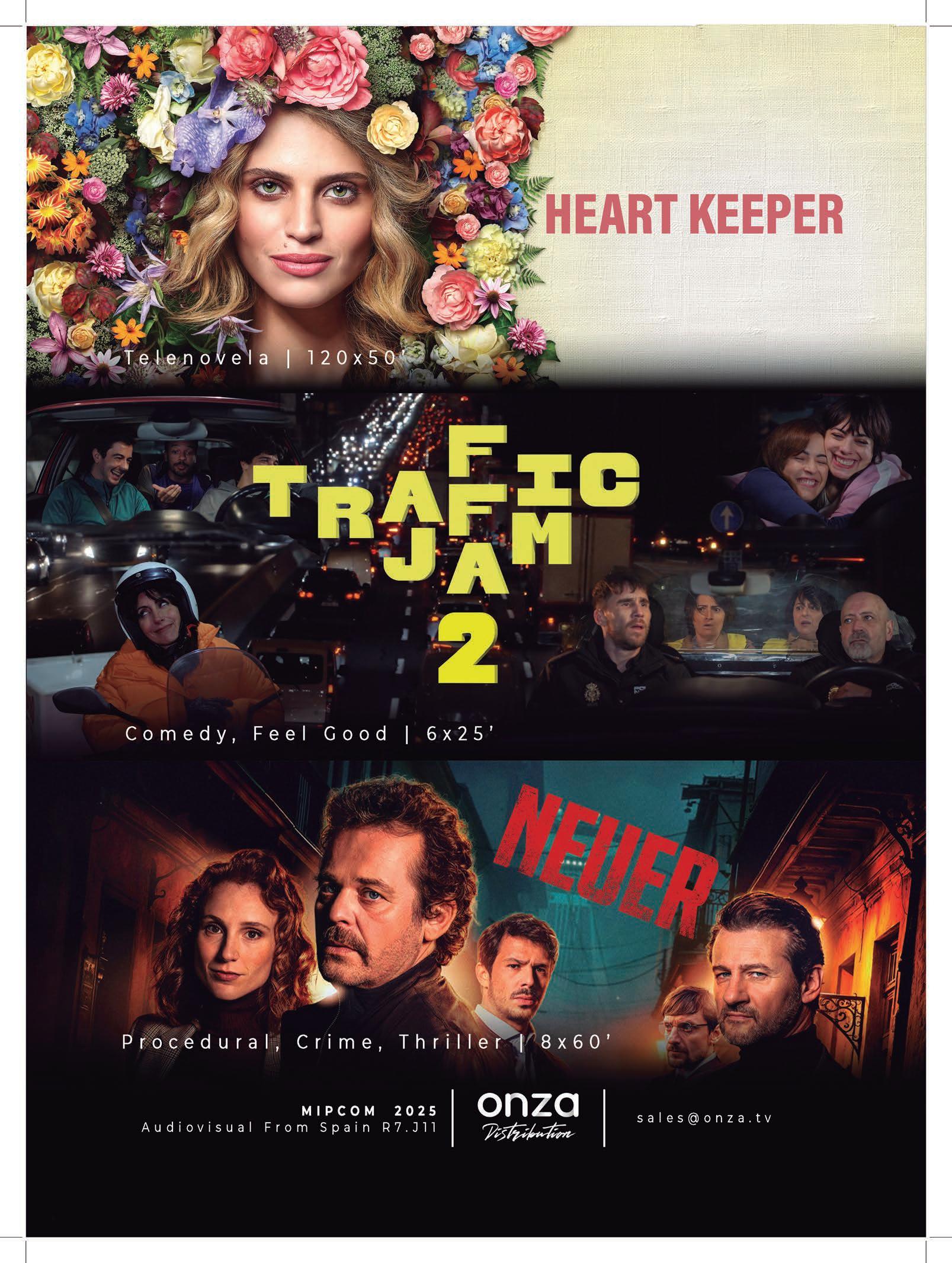
The Color of Love / Traffic Jam / Neuer
From Onza Distribution, The Color of Love follows a young woman who uncovers her mother’s past and unexpectedly finds herself in a love story threatened by questions of inheritance and loyalty. A second season of Traffic Jam is available, continuing to interweave the stories of characters stuck in a traffic jam. “It is proving successful both as a ready-made and as a format, since its universal premise travels seamlessly around the world,” says Erika Gómez, head of sales. Onza Distribution is also presenting Neuer, a procedural based on the novels by Václav Neuer. “For us, MIPCOM is the ideal stage to strengthen relationships with buyers and producers, explore new connections and format sales and continue expanding our catalog with stories that combine strong narratives, exotic settings and universal themes,” Gómez notes.
The Slave Isaura / The Slave Mother / Ultimate Love
Record is bringing to MIPCOM a remastered version of the telenovela The Slave Isaura with full HD visuals and 5.1 Dolby Atmos audio. “The new version allows broadcasters and platforms to relaunch the show as a true ‘television event,’ combining nostalgic appeal with a contemporary aesthetic,” says Delmar Andrade, international sales director. The Slave Mother is also available, deepening the character’s origin story with historical context. Ultimate Love , meanwhile, explores themes of inequality, prostitution and redemption. “These three titles form a powerful portfolio that blends legacy, innovation and thematic diversity, elements that make Record a strategic source of competitive and culturally rich content for the international market,” Andrade says.


“Our mission is to ensure that every title we represent has the potential to travel and connect with audiences around the world.”
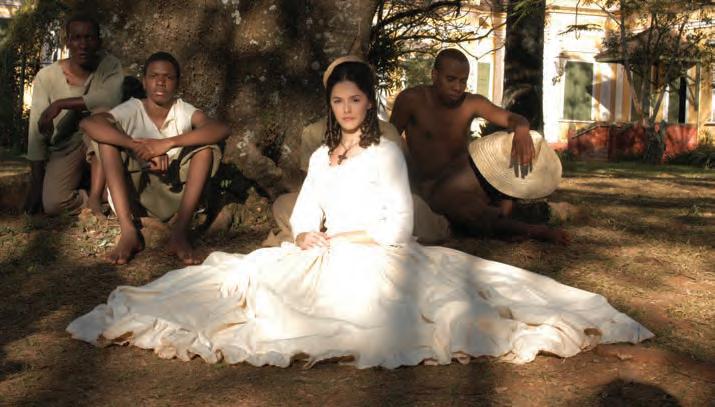
“We’re ready to surprise, move and connect cultures through stories that transcend borders.”
—Delmar Andrade
Marriage / Masked Ninja Akakage
On offer from TV Asahi Corporation, Their Marriage follows a famous lawyer who was enjoying his single life until he suddenly falls in love with a mysterious woman and marries her. As it turns out, his wife is hiding a big secret: her fiancé died in an incident 15 years ago, and the police now suspect that she was responsible. The series is written by screenwriter Shizuka Oishi. TV Asahi is also bringing to MIPCOM Masked Ninja Akakage, directed by Takashi Miike, a modern remake of a manga published about 60 years ago. It is an adventure story about a ninja named Akakage (Red Shadow), who, together with his companion Aokage (Blue Shadow) and other allies, uses ninja techniques to fight against kaiju (monsters) and evil organizations.

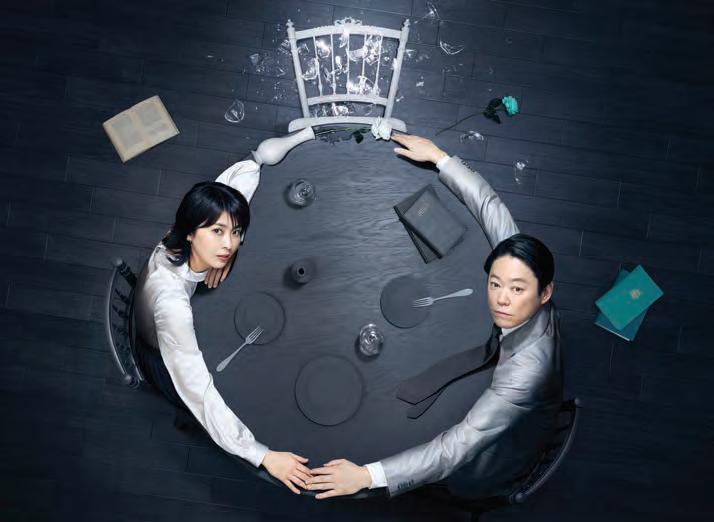


There’s no escaping it; peak drama is long over. In the first half of this year, the number of scripted originals commissioned by the top six global streamers fell by 24 percent compared with the same period last year, according to Ampere Analysis.
There were 318 first-run and renewed titles at Apple TV+, Prime Video, Disney+, HBO Max, Netflix and Paramount+ in the first half of 2024, a 14 percent increase from the year-ago period; this number fell to 242 this year. While streamers have made the most significant cuts, the scripted pullback is industry-wide, with scripted commissions overall down by 8 percent.
“Several factors underpin the reduction in H1 scripted commissions,” said Cyrine Amor, research manager at Ampere Analysis, in the report. “Primarily, the move reflects the streamers’ ongoing strategic shift in their business models post the era of ‘peak TV.’ This is marked by reduced investments in originals, a more cautious approach to commissioning decisions and a heavier reliance on licensing in their content strategies. The uncertain economic climate and the prospect of taxation on international productions have further exacerbated these trends. Regional disparities support this picture. Ampere’s monthly data shows a brief recovery in April 2025, followed by a dip in May after new movie tariffs were announced. Greater clarity on tariffs and the broader economic outlook could drive a rebound in H2.”
Even if there is a rebound, we’re never going back to where we were, so new models for getting shows off the ground are
paramount. Indeed, some are viewing this new landscape as an opportunity, rather than an obstacle.
“Regional broadcasters and independent producers are stepping up,” observes Erika Gómez, head of sales at Spain’s Onza Distribution. “That’s where our catalog shines: we curate distinctive stories with proven international appeal and offer adaptable formats that local partners can truly make their own. Our approach is all about flexibility—finished content for those who need strong titles ready to go and formats for those eager to localize.”
At Escapade Media, Natalie Lawley, managing director, is working with producers to help get smart packages together for scripted funding. “We always approach a finance plan by looking at all options to secure the funding. We have seen very positive trends of presales by individual territories, allowing projects to be greenlit, which may then potentially go to a global platform for the second window.”
Sonia Mehandjiyska, head of international distribution at Electric Entertainment, highlights the value of “being creative and collaborative with our commissioning partners,” as well as exploring new platforms and distribution options. “More deals are necessary to get to a bottom line that will allow us to continue producing.”
Financing remains a challenge, says Dan March, founder and managing partner at Dynamic Television. “This has more to do with the global decline of content value than any one buyer or
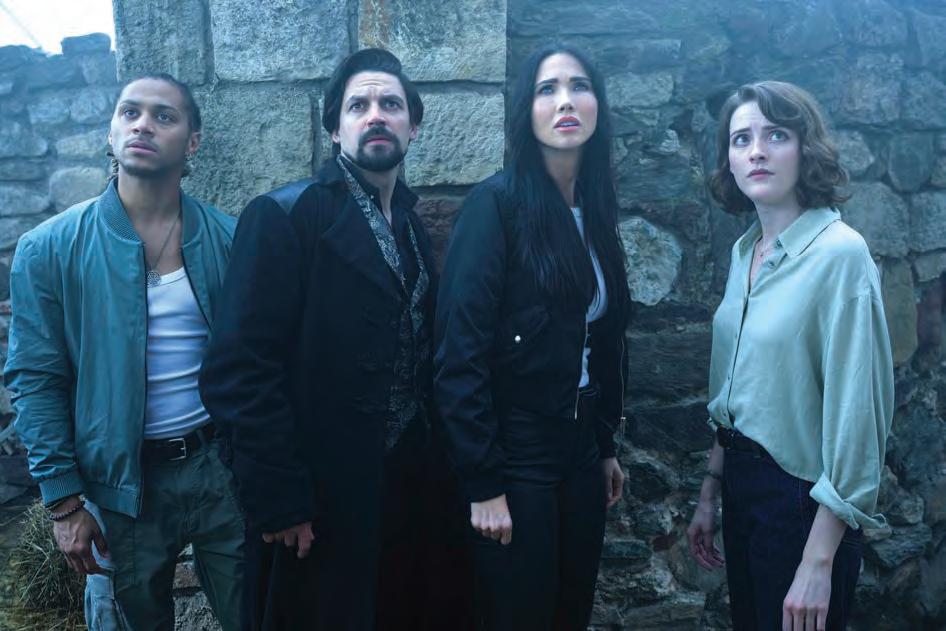
even the cost of production, though the latter is a significant factor. But if we are aligned with our partners and developing a show to a specific budget, we’ve not yet failed to put the financing together.”
Production costs have risen significantly, says Miguel García, sales director at Spain’s Atresmedia Sales, “and it’s becoming increasingly important to reduce budgets to maintain the same number of new productions each year. That’s why it’s always beneficial to look for presale models that combine countries or partnerships between TV networks and platforms.”
Of note, García says, Atresmedia and Netflix joined forces through Buendía Estudios to produce Sira, the sequel to El tiempo entre costuras (The Time in Between). “A major production like this required a presale agreement,” he explains.
Onza’s Gómez references the “move away from single-platform financing to more diversified models where flexibility is essential. Instead of one global buyer covering everything, projects are increasingly built through layered structures that combine regional broadcasters, local streamers and international distributors. Each partner contributes a different piece,

whether through presales or complementary windows across territories. We focus on fostering these collaborations from the earliest stage, making sure that creative ambition is always supported by a financing structure that works across markets.”
Escapade’s Lawley adds: “The question of budget comes up a lot faster now in discussions with commissioners, which is excellent. We work on flexible and innovative finance models, looking to pull finance in from all different areas. It’s really important that the project is put forward with as much of the finance plan in place as possible.”
As for what it takes to land a commission, presale or acquisition, Dynamic’s March says: “Nearly every buyer we speak with is lookin g for shows that ‘sell themselves.’ This speaks to the enormous challenge networks and platforms have in trying to cut through and attract audiences to content. Talent has never been more important in not just securing a green light, but also in having success distributing the show globally.”
For a project to cut through today, it needs to “feel distinctive yet instantly relatable,” Gómez says. “Buyers and commissioners are drawn to bold, original storytelling, but it also has to tap into universal themes that resonate across cultures. We have learned that adaptability is the real differentiator. Stories that travel seamlessly as finished content and formats that give local partners the freedom to create their own versions are the ones that truly stand out. In a crowded market, versatility, authenticity and relatability are what make a project impossible to ignore.”
“You need to have compelling and well-developed characters that will make the audience interested in and care about them,” says Mehandjiyska at Electric. “They don’t necessarily have to be ‘heroes,’ but need to be intriguing and constantly evolving throughout a series. Familiar names and faces are also very important and help decision-makers commit.”
Escapade’s Lawley stresses the need for global appeal. “Whether that is a need for a global platform to be on board or because the commissioner needs ROI, the ability to sell a project internationally is paramount,” she says. “It is also important that each project embraces a trending genre but also offers a very real point of difference.”
Projects that come with some level of brand awareness have a leg up in this contracted and risk-averse landscape.
“The need to present projects based on IP has never been stronger, not only to mitigate risk but also to provide assurance around the project if the IP has been successful in other forms,” Lawley continues.
“Well-known IP has time and time again proven to be a draw for not only viewers but also to buyers and commissioners, which is why we are always looking to continue and evolve our franchises,” says Mehandjiyska, referencing Leverage: Redemption and The Librarians: The Next Chapter .
“It’s true that series based on recognized IPs help to increase the chances of getting commissioned, as the risk of failure is lower,” says García at Atresmedia. “If the audience is already familiar with the story or the characters, it provides a strong boost for the content’s launch marketing.”
The sales arm of the Spanish broadcaster lands at MIP COM with the book-based Las hijas de la criada (The Maid’s Daughters) and ¿A qué estás esperando? (What Are You Waiting For? ) as well as the true-crime-inspired 33 días ( 33 Days ) .
March acknowledges the value of series based on books, “but we are not actively chasing the newest bestseller. What good IP does is attract an audience first and foremost; it [also] helps solve that marketing problem. But IP is not the only way to get a show made. Great storytelling and compelling cast can also cut through, and it ultimately becomes a show that can market itself.”
Crime series continue to be sought out by buyers and commissioners seeking safe bets for audiences.
“Crime, in all its subgenres, is still very popular and globally appealing,” says Escapade’s Lawley. “But we have also seen a need for lighter-based content—whether that is in the form of light drama or lighter cozy crime—there is a desire to balance the offering to audiences.”
Mehandjiyska at Electric sees pronounced demand for American crime-procedurals. “It’s a formula we have perfected and have been very successful with. Although a niche genre, sci-fi is an evergreen trend.”
Dynamic is continuing to lean into “commercial” genres, March says. “We’ve had a lot of success with cozy crime. One factor we have been focusing a lot in our shows is ‘fun.’ Whether crime, thriller or sci-fi, we think audiences are engaging with content to truly be entertained and to have a good time, considering the tension around the world.”
Gómez at Onza also highlights sustained interest in crime dramas, “particularly procedural series and stories inspired by true events. That is why we are especially excited about our new acquisition, Neuer , a crime procedural based on the novels of Václav Neuer, themselves drawn from real cases. At the same time, we notice a clear appetite for feel-good stories and escapist content, both in entertainment formats and in fiction. Shows like Traffic Jam, with its lighthearted, relatable tone, are perfect examples of how audiences want content that allows them to disconnect from daily pressures and enjoy uplifting, universal stories. In today’s market, the mix of gripping crime, adaptable formats and positive narratives is what buyers are most consistently asking for.”
Conventional wisdom would dictate that in a time of reduced commissions, broadcasters and platforms would buy more to meet their programming needs.
March hasn’t seen that happen yet, “though I’m cautiously optimistic for 2026. Some streamers are opening acquisition doors that have been closed for a couple of years, and that is encouraging. But the larger platforms that are still spending $10 billion to $20 billion on original content certainly don’t have a dire need to acquire as well.”
Gómez is beginning to see a shift toward more acquired fare. “With fewer originals being commissioned, many platforms are leaning more on acquisitions to keep their catalogs dynamic and their audiences engaged. Finished content,

particularly strong dramas and crime series ready to air, are in very high demand.”
Atresmedia has been clinching second and third windows on some of its successful dramas, García says. “These are productions well known to audiences, with strong appeal and retention power, which is essential nowadays.”
Escapade’s Lawley says that “platforms are acquiring scripted series that have performed well on other media and introducing them to new audiences who are viewing content only via platforms. This strategy provides a more cost-effective approach to language versions, allowing them to purchase already created dubbed/subtitled versions.”
While still in its early days, AI dubbing could be transformative for the scripted industry—once costs come down and the quality improves. That is just one area where AI is expected to be a game-changer.
“AI is beginning to shape the scripted business, but more as a support tool than as a creative replacement,” says Gómez. “We see it being applied in research, in generating marketing assets and in streamlining parts of the production process. These are useful efficiencies, yet the heart of scripted content remains human: originality, idiosyncrasy and storytelling that resonates with audiences. AI can enhance the way projects are developed and promoted, but it will never replace the creative talent and strong ideas that drive our industry forward. AI is a copilot, not the driver.”
“I’m a believer that AI will have a positive impact on lowering production costs, certainly in post and in VFX, and I also believe AI can have a positive impact on storytelling,” Dynamic’s March says. “I’m not a believer in using AI to create or write stories, nor do I believe fully generative content can ever replace great scripted drama and the creativity that is uniquely human.”
Distribution recently took on the rights to Neuer, based on Václav Neuer’s best-selling novels.

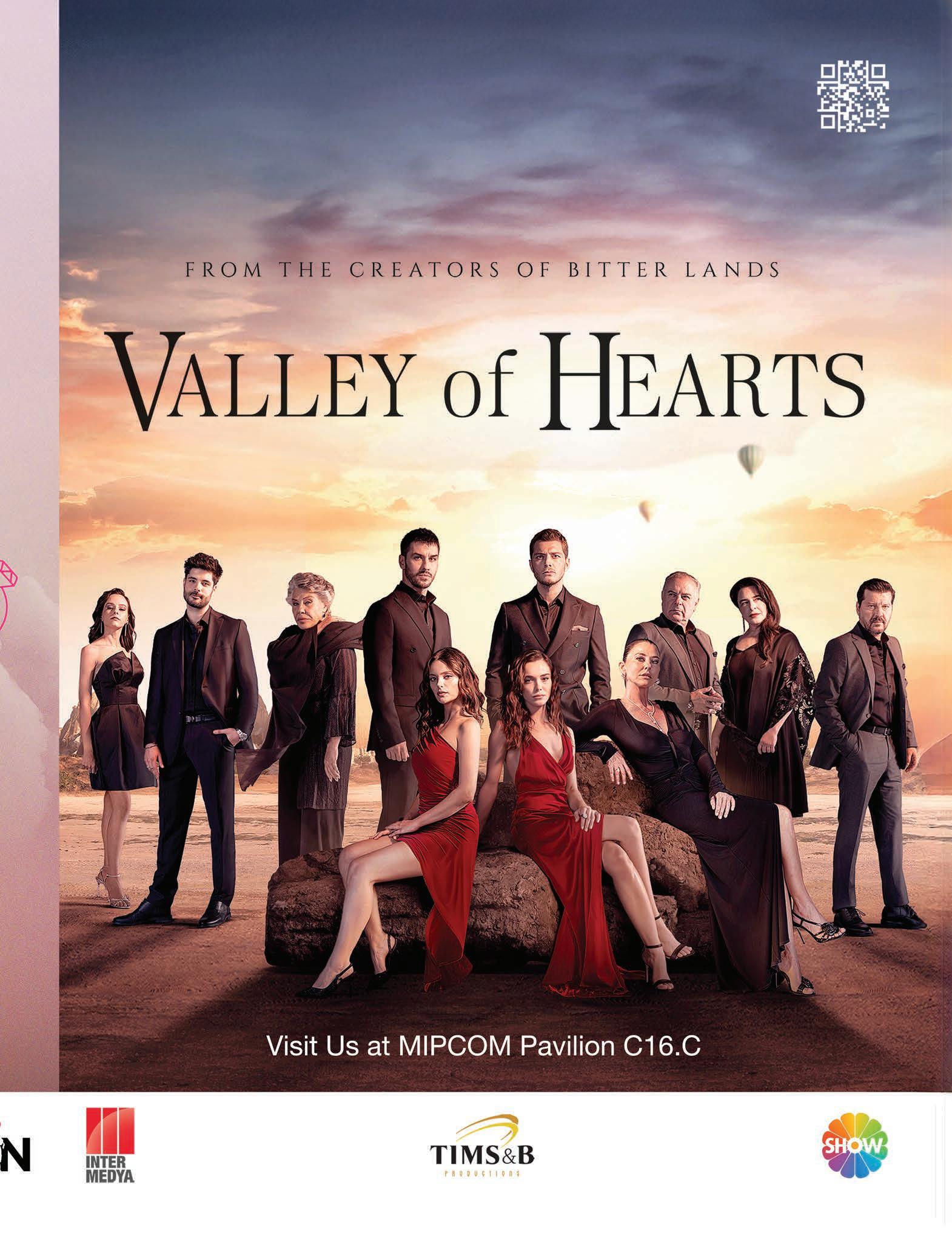
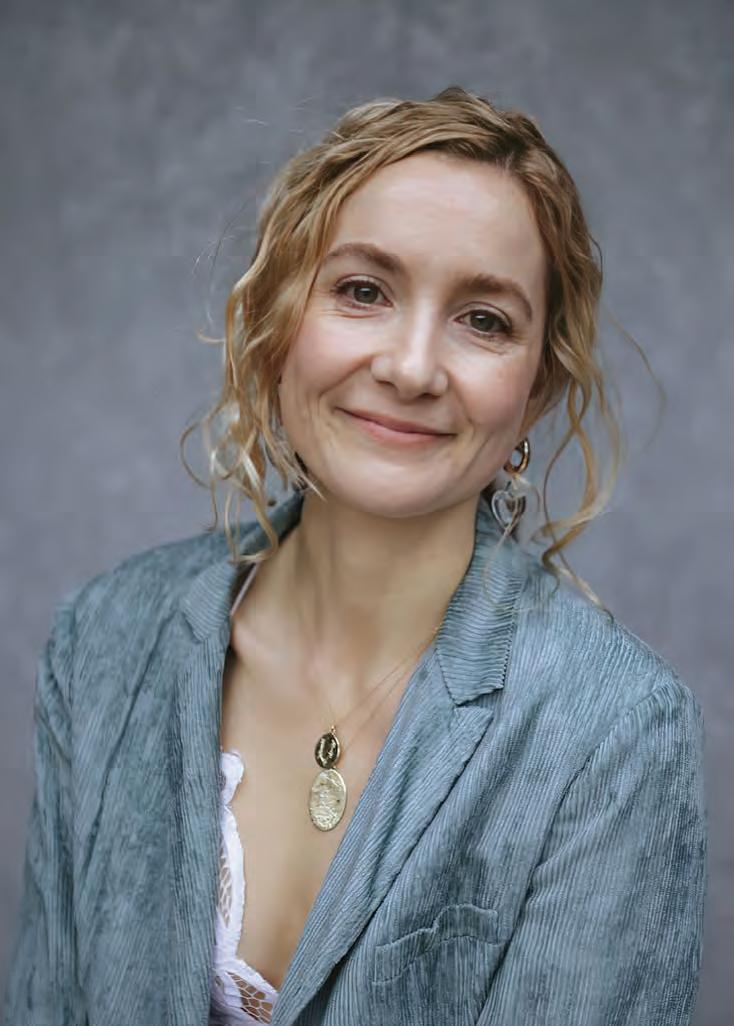
By Mansha Daswani
Up until this year, no one had succeeded in bringing the events that led up to the Norman invasion of Eng land in 1066 to the prestige drama space. King & Conqueror, which premiered on BBC One in the U.K. and Prime Video in the U.S., required years of planning and a fair number of partners to realize its grand ambitions, which included recre ating the landmark Battle of Hastings, rich special eff ects and a star-studded cast. James Norton stars as Harold, Earl of Wessex, and Nikolaj Coster-Waldau as William, Duke of Normandy. Both also serve as executive producers on the eightpart production. Several entities came together to execute on the series, with The Development Partnership, the production arm of The Partnership Group talent agency, aligning with Rabbit Track Pictures (Norton’s production company), Richard Halliwell’s Shepherd Content, Baltasar Kormákur’s RVK Studios in Iceland and CBS Studios. Kitty Kaletsky, co-founder of Rabbit Track with Norton, has been with the series, created by Michael Robert Johnson, since its inception. She talks to TV Drama about the scale of the show and what she hopes viewers will take from the retelling of this transformative time in history.
TV DRAMA: What appealed to you about King & Conqueror? KALETSKY: It was one of, if not the first, projects we ever discussed. Mike, our writer, figured out that the reason 1066 and the Battle of Hastings have never been adapted is because it’s not solely the Harold Godwinson story that’s interesting, nor solely the William the Conqueror narrative that would ignite a drama. It’s about the interconnection of their two tales. Once he had unlocked that solution, it becomes about marriage as well. It becomes about not just one nation but two. It becomes about the formation of a new continent and arguably a new world. Starting with a character, but then blowing it out globally, appealed to all of us from a creative perspective and from a commercial perspective. That’s been the bedrock of the development process from the very beginning. How do we tell two men’s stories, two couples’ stories and two nations’ stories and make it feel personal and yet also universal? Everything appealed to me. Plus, it felt important because it hadn’t been done before.
TV DRAMA: What sorts of research did you have to do to accurately portray these characters and this time period?
KALETSKY: It was incredibly fun, honestly. On the one hand, there’s a plethora of material. From a historical perspective, we read Peter Rex’s Edward the Confessor: King of England. There’s an incredible book by Tracy Borman, Matilda: Queen of the Conqueror , on how brilliantly strategic and well-educated she was. There were a couple of books that we read on the everyday life of medieval London and the Norman conquest. There is also a lot that you can lean on in terms of primary sources. But the brilliance of creating a drama that’s almost a thousand years old is that there are also huge gaps. That’s where artistic license comes in. We did a ton of research. We also had a historical advisor throughout the development process noting on every one of the eight scripts, guiding us, highlighting the bits that we knew were filling in the gaps and less likely to be accurate. And then Mike and his approach to language, his approach to storytelling, leaned into the bits that we have to dramatize in order to appeal to and then retain an audience. In a quick answer, it’s incredibly well researched, but it’s also a drama, not a documentary. That was something that we wanted to revel in.
TV DRAMA: What was your approach to managing all the different stakeholders as a multiparty international copro while also maintaining a singular creative vision?
KALETSKY: Having a singular vision from the start is always incredibly helpful. It does sound like a huge number of names, which might lead to a huge amount of conflict. But with Baltasar Kormákur as lead director, Mike’s brilliant scripts and the EPs supporting the two of them, we had a pretty smooth creative process. Financing a show of this nature is always really difficult, but everybody was singing from the same hymn sheet. It felt a lot simpler than it looks.
TV DRAMA: How did you set about finding locations to film at?
KALETSKY: RVK Studios was a huge part of that. Having a production services company that was producing alongside us in Iceland meant that they were heavily
involved in the creative as well as in the practical. In terms of our exteriors, on location in Iceland we had to find Norway, Wessex countryside, Northumbria—which looks very, very different from the south of England— Flanders, a location for Stamford Bridge and its battle, and then obviously the Battle of Hastings on a very par ticular incline we needed to replicate. It wasn’t easy, but actually, Iceland has a pretty varied landscape, and because it’s such a small country, it’s also not that diffi cult to find spectacular scenery not far outside of Reyk javík. The locations are plentiful and varied. And then obviously supported by visual effects in order to kind of enhance that look.
TV DRAMA: What are you hoping people will take from the show? Are there parallels to that time in history that you think people should be thinking about now?
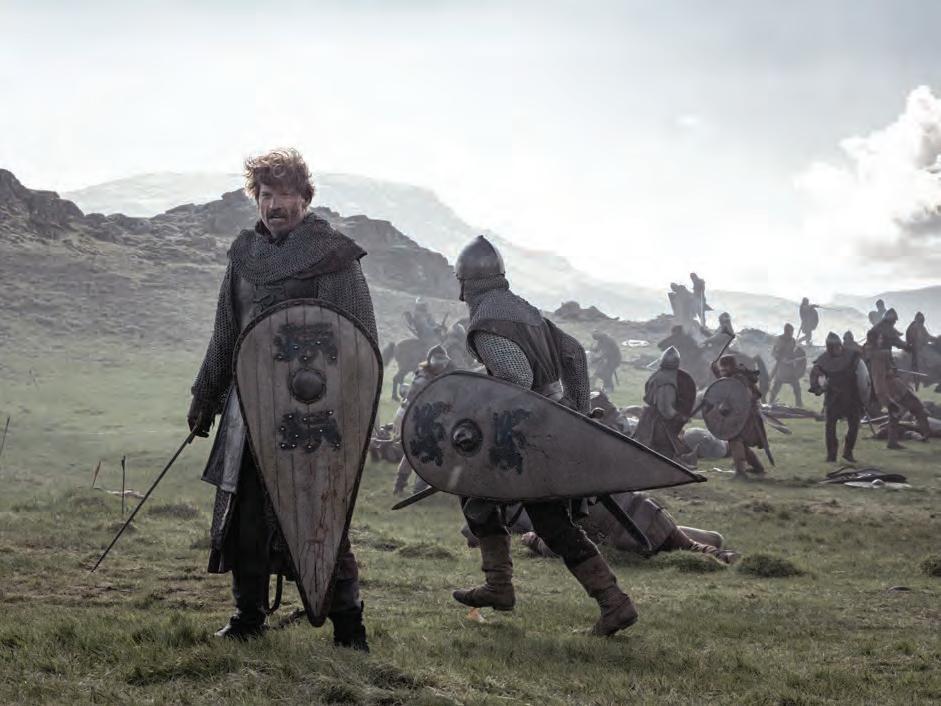
KALETSKY: For time immemorial, mostly male ambition, ego and hubris have created countries and also collapsed them. What is particularly powerful about this story is it’s the tale of two men, neither of whom was destined for the throne, neither of whom, at least at the start of our narrative, wants the throne. [That changes due to] baronial factions, the politics of their respective nations and then ultimately their own personal ambition. One of them had to die, and England,
as we know it, fell apart and was reborn. So, yes, there are many parallels. But it’s also a universal story because of the family dynamics that it looks at. It plays out on a global scale and it looks at hubris and ambition. It also plays out on a domestic scale and it looks at marriage, the relationship between fathers and sons and betrayal. You can take away what you want from it, depending a lot on, as a viewer, what you project onto it.
As an arm of The Partnership Group agency, The Devel opment Partnership, led by Robert Taylor, has been developing film and television projects directly with its stable of on- and off-screen talent. The outfit was instrumental in assembling the intricate pieces for King & Conqueror, including bringing James Norton on as executive producer and star. Taylor talks to TV Drama about managing the complicated co-pro.
TV DRAMA: How did you come to be involved in the project?
TAYLOR: Michael Robert Johnson, our writer and creator, sent me a two-page document for his particular take as to how he wanted to tell this story. The first thing I did was Google, When was the last time there was a series about the Battle of Hastings? It felt exciting but familiar, particularly in the U.K. It was astonishing that it hadn’t been told in episodic form before. I had started to discuss with James [Norton] the idea of him taking on more of a producer role in the work that he was going to be doing. He liked it very much. Through that, we discussed the idea of James starting a production company, which we couldn’t do until we had found the person to start the production company with: Kitty [Kaletsky]. We spent all of the first lockdown on Zooms with each other every day, figuring out how not only to develop the show, but also how to package it. We came out of that very strange time with Baltasar [Kormákur] attached as director and EP.
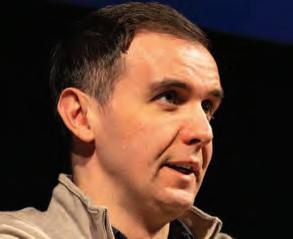
TV DRAMA: What was your approach to managing all the different stakeholders as a multiparty international copro while also maintaining a singular creative vision?
TAYLOR: We’re very fortunate we’ve got multiple parties with vested interests in the show, and all of the individuals charged with the responsibility of the show at those places cared deeply about it and were amazing teammates. You see the series of credits and it feels like it must have been thousands of people involved, but it was a core team of about eight of us that went through this process together. It was a necessity of our financing that it was a multiparty co-production process. It’s also a truly international show in terms of what our story means for the formation of what is now Europe. It felt appropriate to have that international co-production structure in order to tell that story authentically. Kitty is our creative lead and has been exceptional in playing that role throughout. Kitty and I, together, strategically and diligently, kept everybody informed. We all felt on day one that we wanted to make the same show, and ultimately that’s the key. We’ve probably all been involved in multiparty processes before where one broadcaster is making one show and another one’s making another, and that was not the case here. Everybody had an understanding of the vision.
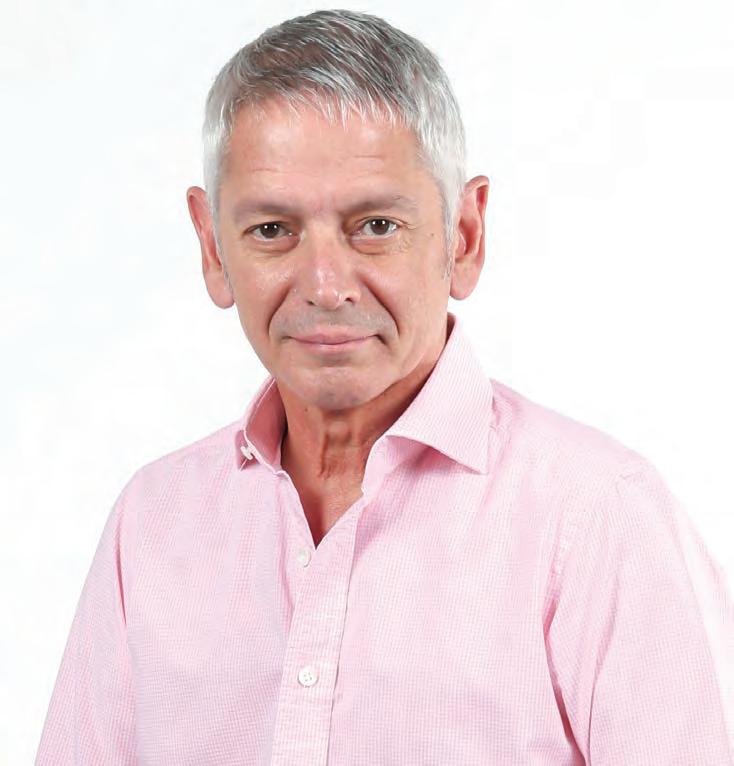
By Mansha Daswani
Along-standing player in Turkey’s dynamic content landscape, Inter Medya continues to see gains in the competitive drama business thanks to two key strategies, according to founder and CEO Can Okan: consistency and adaptability. With an eye on future-proofing the business, Inter Medya is entering the vertical drama space, expanding its co-produc tion activities and exploring the scripted format business while continuing to roll out both “traditional” and next-generation Turkish stories worldwide. Okan shares with TV Drama his strategies for keeping Inter Medya at the forefront of the content business.
TV DRAMA: What is driving Inter Medya’s leading position as a supplier of Turkish dramas?
OKAN: Our leading position is built on two pillars: consistency and adaptability. Over the years, we have established long-term partnerships with both producers and broadcasters, and today, our catalog encompasses more than 15,000 hours of content. This scale allows us to meet a wide variety of needs—from mainstream primetime dramas to digital-first miniseries. We constantly track audience behavior and market trends. When viewers began demanding shorter, bingeable formats, we responded with our “New Generation” strategy, while continuing to deliver the storytelling elements
that made Turkish dramas globally successful in the first place—family dynamics, love, betrayal and deep emotion. Equally important is our global distribution reach. We have sold into nearly every major territory, spanning Latin America, Europe, Asia and Africa, while also opening up new windows such as airline entertainment. For example, several leading airlines have recently added Turkish dramas from our library to their in-flight plat forms—a clear signal of our content’s versatility and universal appeal. At the same time, we are a company that thrives on being proactive and forward-looking. We aim to anticipate client needs before they emerge, positioning ourselves not just as a distributor but as a trusted solutions partner. We embrace new spaces, experiment, learn and evolve—an approach that keeps us dynamic and pioneering. Distribution will always remain our core business, but integrating innovations and sector developments into what we do has always been and will continue to be our priority.
TV DRAMA: Tell us about Eshref Ruya and how you are positioning it globally.
OKAN: Eshref Ruya is one of the most high-profile and prestigious titles on our slate this year. Produced by TIMS&B Productions, the series marks the long-awaited on-screen union of two of Turkey’s most celebrated stars, Çağatay Ulusoy and Demet Özdemir. This firsttime casting of the duo has already generated exceptional anticipation in Turkey and across international markets. At its core, the story captures the universal themes global audiences are craving today—love, drama, power, betrayal and hidden truths. Yet what sets Eshref Ruya apart is its cinematic scale, emotional intensity and distinctive storytelling, qualities that have become synonymous with Turkish drama at its finest. We are positioning Eshref Ruya as a flagship premium drama with the highest production values. The series appeals to both female and male viewers alike, offering a fastpaced narrative where every episode escalates the tension. Each character introduces a new layer of depth, brought to life through outstanding performances. From script to direction, production to music, and acting to cinematography, every element has been crafted to deliver a drama of exceptional quality. For us, every title in our catalog is unique, but Eshref Ruya stands out as a project that not only enriches our lineup but also offers distinct points of connection for every client and territory. Moreover, it further strengthens our longstanding partnership with TIMS&B Productions, underscoring our shared commitment to creating global hits.
TV DRAMA: What makes it unique in the Turkish landscape?
OKAN: What truly sets Eshref Ruya apart is its genredefying storytelling. It is not confined to being solely a love story or a tale of power struggles—it is both, enriched with profound themes of love, loyalty and

identity. Nisan, portrayed by Demet Özdemir, is an idealistic musician who finds herself drawn into a double life as an undercover informant to protect her sister. Eshref, played by Çağatay Ulusoy, is a commanding figure whose strength is shadowed by the haunting memory of his first love. Their dynamic creates a powerful emotional contrast, driving the story with both tenderness and intensity. Just as the characters embody duality, the series itself maintains a remarkable balance: romance is matched by gripping momentum, and its dramatic weight is softened with moments of warmth and humor. On top of this, the exceptional production values further elevate the experience. From its striking visual design and carefully composed music to its rhythm and pacing, every element is crafted to sustain audience engagement episode after episode. Turkish dramas are already renowned for their emotional impact, but Eshref Ruya intensifies that tradition, offering a bold, refreshing and standout production.
TV DRAMA: Where else are you seeing strong interest in Turkish content?
OKAN: Alongside Eshref Ruya , we are presenting a strong and diverse lineup that reflects the breadth of our catalog and the evolving demands of the global market. Valley of Hearts continues to expand its footprint, achieving remarkable success in Latin America and remaining a prime-time hit in Italy. Deception recently sold into Spain, Honduras and Italy, among others, demonstrating its broad international appeal. Heartstrings , licensed in Romania, Colombia, MENA and beyond, resonates worldwide with its universal themes of family and love.
We are also placing a spotlight on what we define as our “New Generation” Turkish series—shorter, fasterpaced miniseries such as Modern Woman, Fer, Mr. Right and Just Friends . These titles are specifically designed with streaming platforms in mind, offering tighter storytelling and innovative approaches that blend genres in fresh ways. Our feature film catalog is also stronger than ever, complemented by an updated and refined formats portfolio. Finally, at MIPCOM, we are excited to announce our official entry into the world of vertical drama. This initiative will see us both producing original content and curating a dedicated catalog of ready-made titles, ensuring we remain at the forefront of one of the industry’s most dynamic emerging trends.
TV DRAMA: What new opportunities are you pursuing for your productions?
OKAN: Co-productions remain an exciting area of growth for us. As pioneers of this business model in several countries, we are committed to continuing our leadership in this space. At the same time, we are placing
strong emphasis on emerging markets: Southern Europe has become a hub for Turkish dramas, while demand is accelerating across Asia and Africa. Streaming platforms continue to expand the horizons for our content worldwide. Looking ahead, we are also investing in vertical dramas and actively working to bring the remake rights of our titles to new territories. Our strategy is to continuously enhance our catalog both in quality and volume, while steadily growing our global client base.
TV DRAMA: What are your overall goals for MIPCOM?
OKAN: MIPCOM is always a cornerstone market for us, and this year our objectives are once again very clear. Our first priority is to launch Eshref Ruya as a global event series, securing partnerships in key territories. Second, we aim to showcase the breadth of our slate, from major prime-time dramas to our “New Generation” titles—highlighting the full spectrum of what we can deliver to international buyers. But MIPCOM is about more than sales. It’s a platform for strategy and partnership. We are here to advance our co-production discussions, explore new format deals and position Inter Medya not only as a distributor, but as a creative partner helping shape the future of Turkish content worldwide. We will also be presenting our vertical drama model, accelerating conversations around potential collaborations in this exciting new area.
Our message is clear: Inter Medya is not just keeping pace with global trends; we are actively shaping them. We are showing how Turkish content can evolve with new consumption habits and platforms, while never losing the emotional depth that makes it unique. At the same time, we are investing in the future by building lasting partnerships, embracing innovation and creating content that resonates across cultures and borders. That is our mission at MIPCOM: to showcase the strength, creativity and diversity of Turkish drama and to reaffirm that Inter Medya will remain a driving force in shaping the global content landscape.
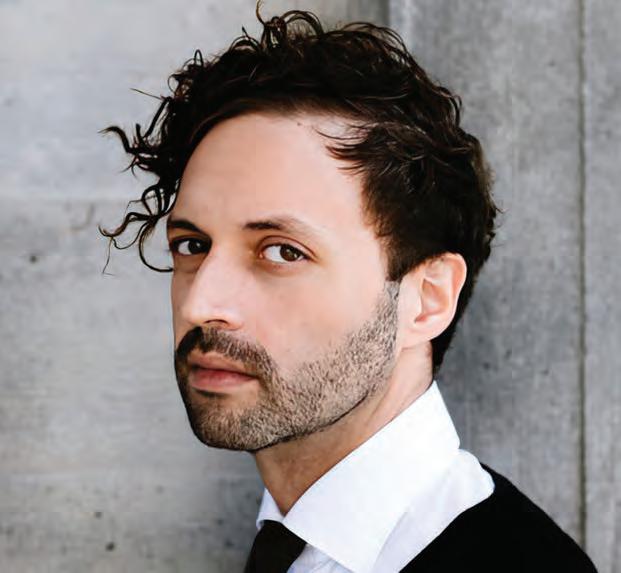
By Mansha Daswani
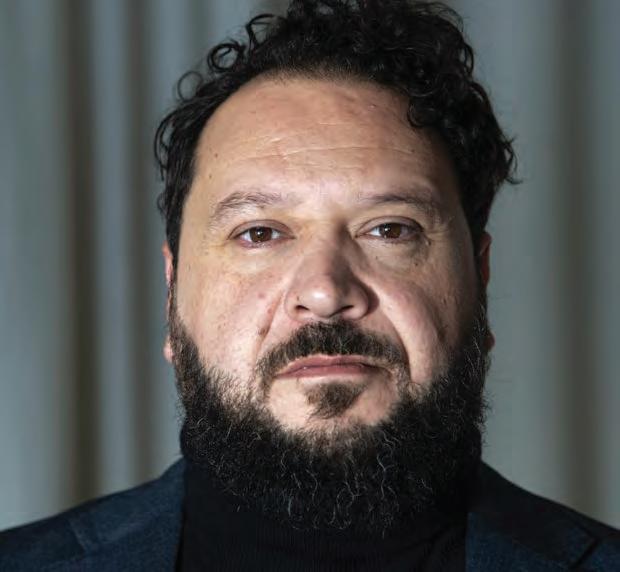
Abr oad swathe of broadcasters from across Europe have boarded Vanguard, the Swedish event series that tells the story of media tycoon Jan Stenbeck. The production was commissioned from FLX by SVT in collaboration with the New8 alliance of European pubcasters. Viaplay Content Distribution has secured a number of deals for the series, which won best series and best actor for lead Jakob Oftebro at the Monte-Carlo Television Festival’s Golden Nymph Awards this year. Alex Haridi, writer, and Goran Kapetanović, director, discuss with TV Drama how the series approached chronicling Stenbeck’s impact on European media, his tumultuous family life and his complicated legacy.
TV DRAMA: What appealed to you about telling the story of Jan Stenbeck?
HARIDI: I grew up during the end of his life. At that point, he was a joke in Swedish culture. He’d become such a larger-than-life character. He’d gained a lot of weight. He was very abrasive and conflict-prone. [I had been thinking about] where we are today with fake news, the way communication works, where you don’t trust sources; media is very much in doubt. We no longer
share a common truth. I was fascinated by this man because he was part of the start of disrupting media. So, it started from, how did we come to this point [in media], from a Swedish perspective?
He was extremely handsome back in the 1970s, and he was incredibly glamorous. These things clashed with the picture I had in my mind of him as this sad, overweight joke. It was the dual stories of how we reached this point in time and his personal story, which was so fascinating. How does this wonderful, happy, joyous, attractive young guy end up as this sad clown?
KAPETANOVIĆ: It was also an interesting story about family. It’s a classic succession story. And, of course, the ’70s and ’80s were a time of such transformation. We find a playground in China to produce inexpensive goods for Europe and the U.S. It’s the Margaret Thatcher era. We moved industry abroad and started something totally new here.
TV DRAMA: What was the approach to portraying an accurate representation of this polarizing figure?
HARIDI: I wanted to show his bad sides. In the Swedish context, that’s what he’s famous for. At the same time, it’s very
much the story of how he becomes a joke. It’s a “becoming” story. If we’re going to emotionally invest in that, if we’re going to feel anything at the end when he is a pretty horrible person, we have to sympathize with him along the way. It was a question of communicating to the audience in a way that they understand why he’s doing these things, while not excusing them. So, showing the horrible things that he does while also understanding why he does them.
TV DRAMA: Goran, how did you approach re-creating the look and feel of the era?
KAPETANOVIĆ: When you go back in history to the ’70s, it’s such a rich time. There are many details where you can express yourself. Numerous revolutions were occurring in clothing, furniture and everything else. We were trying to describe 20 years of one person’s life. The cinematographic expression is very powerful. We put a lot of effort into postproduction.
HARIDI: I’m so proud of the look of the show. One of the things that I, as a writer, really love about Goran as a director is that, even though the details are there, what he cares about is the story, the characters and the actors. It never becomes a fetish of filming individual old objects that we’ve spent weeks trying to find. We spent weeks trying to find them, and they’re there in the frame. If you look, you can see them. But it’s always about the story and the characters. They’re moving comfortably in these old clothes. That’s a credit to Goran and his directing style.
TV DRAMA: What is your approach to working with your onscreen talent? How do you get the best out of them on set?
KAPETANOVIĆ: I’ve been doing this for a couple of years now, bringing some new talents from Sweden and across Scandinavia and giving them a chance. We are very familiar with some old faces here, the people who are getting the roles for the TV shows. I always try to find someone who is involved and engaged in the story. They want to show something new. They have such an interest in the characters. I give them a push, of course. I work with them to go deep into the character. It was a bit of method acting at times for the main character. We went on to drink and eat as the main character did during the ’70s and ’80s, and we tried to do it in three days. We gained two or three kilos! [Laughs]
TV DRAMA: What do you want audiences to take from the series?
HARIDI: One of the things that was so fascinating about this story was how much these things that we take for granted now happened by accident. This whole thing spirals out of a stupid conflict that he has with his sister. He changed so much in the world, in the landscape of media, and it’s basically because of a brother and a sister fighting on the playground. And it’s just stupid and it’s ridiculous, but that’s the way the world works. If there’s something that I want people to take from this, it’s that the way things are today is not God-given. Things change, they change fast, we’ve changed them fast and sometimes things change for really stupid reasons.
KAPETANOVIĆ: He started all these things we have today. I think he realized we are going to reach this point. Maybe that was part of his destructive time. He made so much, but he asked himself, What’s going to happen next after this?
Distributed by Viaplay Content Distribution, Vanguard, about Swedish media mogul Jan Stenbeck, has the backing of the New8 alliance.

The latest edition of the TV Drama Screenings Festival features crime dramas, sci-fi, romance and more.
BAFTA TV nominee Keeley Hawes stars as Julie, a retired hitwoman living on a remote Greek island who is forced into a game of survival with her estranged son, Edward (Freddie Highmore). (All3Media International)


Eshref, a man who has everything but belonging, is unknowingly drawn back to his lost childhood love, discovering a destiny of passion he never imagined. (Inter Medya)
Melike, wrongfully imprisoned for 20 years, dreams of reuniting with her daughter. Upon release, she searches for her husband’s real killer and must confront the complexities of her daughter’s life. (Kanal D International)

(Galicia, 1900. Clara and Catalina, born into different classes, are torn apart by revenge, heartbreak and a mother’s fight to secure her daughter’s legacy. (Atresmedia Sales)
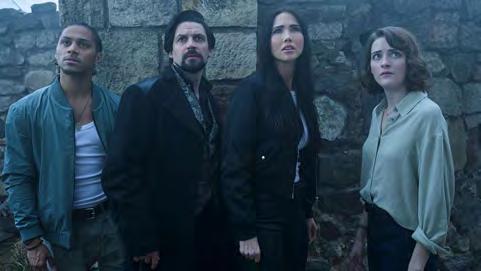
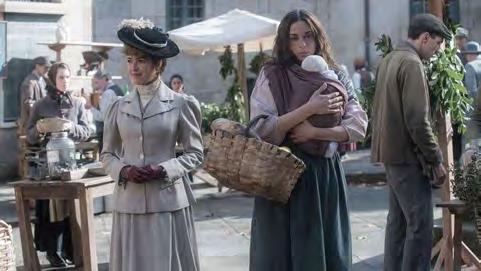
When a “Librarian” stuck in the present inadvertently releases magic across the continent, he is given a new team to help him clean up the mess he made. (Electric Entertainment)
A historical fantasy where ninjas face colossal monsters, blending intense action, emotional drama and groundbreaking visuals to captivate audiences worldwide. (TV Asahi Corporation)


Under the shadow of illness, family expectations, corporate rivalries and buried secrets, the journey of Selim and Meyra becomes the ultimate test of love, honesty and the choice to stand by one another. (ATV)
Forbidden love reignites the feud between the Bereketoğulları and Karahanlıs. As vengeance brews, Ömer and prosecutor Nevin collide, their pursuit of justice entwined with desire. (Eccho Rights)


After sweeping across Asia, the micro-drama boom is reverberating throughout the scripted ecosystem.
By Mansha Daswani
More than $1.75 billion was invested in the short-form content platform Quibi, the brainchild of Jeffrey Katzenberg that crashed and burned just a few months after its launch in 2020. As it turns out, Katzenberg and company may have just had really terrible timing. Five years later, with the streaming wars firmly behind us and TikTok now regularly topping the likes of Netflix in the most-used platforms for younger audiences, the short-form video market is now a real revenue opportunity. How big a revenue opportunity depends on where you are. In China, micro-drama revenues will surpass the domestic box office this year, according to Media Partners Asia (MPA). According to The Micro-Drama Economy
report, revenues in China from microdramas climbed to $7 billion in 2024 and are expected to top $16.2 billion by 2030. MPA projects that more than 830 million viewers are consuming micro-dramas, with 60 percent paying for access. The market is led by ByteDance (Red Fruit), Tencent (WeChat Video Accounts) and Kuaishou (Xi Fan), delivering titles from leading players such as COL, China Literature and Tomato Nov el. Advertising will account for 56 percent of revenues by 2030, with subscriptions at 39 percent and commerce at 5 percent. Marking a new stage in micro-dramas’ growth, budgets are on the rise in China, with premium titles budgeted at between $400,000 and $600,000.
A wealth of players are starting to position themselves in the market out side of China, which is projected to generate revenues of $9.5 billion by 2030, a compound annual growth rate of more than 28 percent from 2024. Revenue will be subscription-led, at 74 percent, with advertising at 25 percent and commerce at just 1 percent.
The U.S. is the most lucrative territory, with revenues hitting $819 million in 2024 and rising to $3.8 billion by 2030. Affluent, urban women aged 30 to 60 are leading microdrama adoption in the U.S. Key players include DramaBox, which reported a profit in 2024, and ReelShort.
“We want to tell good local stories in a micro-drama format,” Enoch Chen, COO of leading player COL Group, said at APOS in Bali this summer. “It’s very different from long-form. Equally important, we need to understand our audiences. That’s why we’ve formed a production studio in L.A., so we have people who understand the American culture and can tell a story that resonates with our target audience. The U.S. is our biggest market right now. The next one is Japan, and Southeast Asia is one of our fastestgrowing markets.”
Outside of the U.S., MPA similarly identifies Japan and India as key territories. In Japan, micro-drama revenues are projected to hit $1.2 billion by 2030. The Indian market is being boosted with the arrival of Amazon in the space, with its free platform, MX Player, launching MX Fatafat for micro-dramas.
Vivek Couto, executive director of MPA, says: “Microdramas have evolved from a niche experiment to a multibillion-dollar global category. Production is cheap, but dis tribution is costly, and success depends on speed, scale and repeatable IP. China’s ecosystem shows what’s possible when content is integrated into social and payments rails, while the U.S. is proving the viability of global expansion. Markets such as Japan, Korea, India, Southeast Asia and Latin America are emerging. The winners will be operators that control their distribution and monetization infrastructure, manage customer acquisition costs and build sustainable IP pipelines.”

